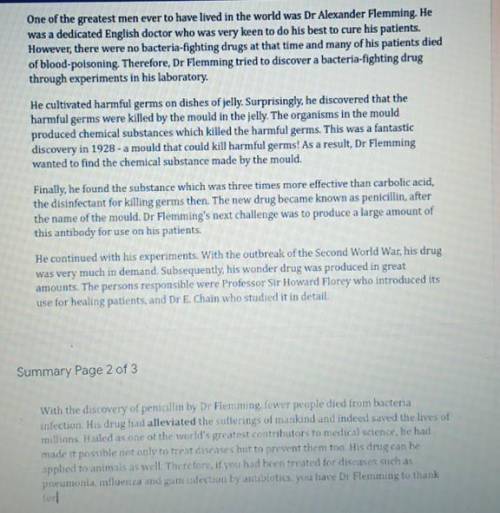
In recognition of his brilliant discovery, Dr Flemming was knighted, a reward richly befitting his contribution to mankind.
alleviate- to make something bad such as pain or problems less serve
knighted- to give someone the rank of knight
befit- to be suitable or right for
What are the list of five points
Please help


Answers: 3
Other questions on the subject: English

English, 21.06.2019 18:30, devenairefp85xfg
Why is “playing it cool” laced with irony for starr? the hate u give
Answers: 1


English, 22.06.2019 03:10, chloesmolinski0909
Which literary device does orwell most use to support his purpose in writing in this passage? characters, to show that what happens on the farm is fiction allegory, to show similarities between the farm and the soviet union point of view, to show how the characters think about the murders setting, to show that events in the soviet union may have been caused by the economy
Answers: 2

English, 22.06.2019 04:50, ilawil6545
Read the passage, then answer the question that follows. no one could have seen it at the time, but the invention of beet sugar was not just a challenge to cane. it was a hint—just a glimpse, like a twist that comes about two thirds of the way through a movie—that the end of the age of sugar was in sight. for beet sugar showed that in order to create that perfect sweetness you did not need slaves, you did not need plantations, in fact you did not even need cane. beet sugar was a foreshadowing of what we have today: the age of science, in which sweetness is a product of chemistry, not whips. in 1854 only 11 percent of world sugar production came from beets. by 1899 the percentage had risen to about 65 percent. and beet sugar was just the first challenge to cane. by 1879 chemists discovered saccharine—a laboratory-created substance that is several hundred times sweeter than natural sugar. today the sweeteners used in the foods you eat may come from corn (high-fructose corn syrup), from fruit (fructose), or directly from the lab (for example, aspartame, invented in 1965, or sucralose—splenda—created in 1976). brazil is the land that imported more africans than any other to work on sugar plantations, and in brazil the soil is still perfect for sugar. cane grows in brazil today, but not always for sugar. instead, cane is often used to create ethanol, much as corn farmers in america now convert their harvest into fuel. –sugar changed the world, marc aronson and marina budhos how does this passage support the claim that sugar was tied to the struggle for freedom? it shows that the invention of beet sugar created competition for cane sugar. it shows that technology had a role in changing how we sweeten our foods. it shows that the beet sugar trade provided jobs for formerly enslaved workers. it shows that sweeteners did not need to be the product of sugar plantations and slavery.
Answers: 1
Do you know the correct answer?
In recognition of his brilliant discovery, Dr Flemming was knighted, a reward richly befitting his c...
Questions in other subjects:


History, 22.08.2019 05:00



Physics, 22.08.2019 05:00

Mathematics, 22.08.2019 05:00

Mathematics, 22.08.2019 05:00


English, 22.08.2019 05:10

English, 22.08.2019 05:10






